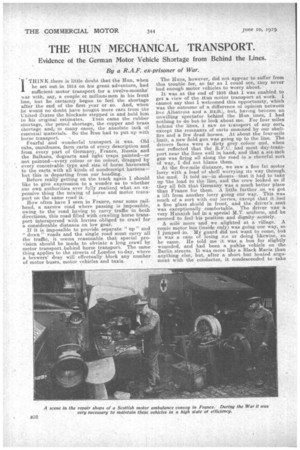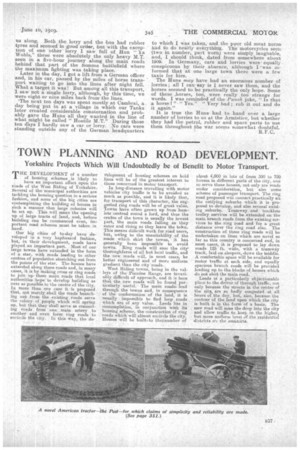THE HUN MECHANICAL TRANSPORT.
Page 14

Page 15

If you've noticed an error in this article please click here to report it so we can fix it.
Evidence of the German Motor Vehicle Shortage from Behind the Lines. By a R.A.F. ex-prisoner of War.
-I THINK_there is little doubt that the Hun, when he set out in 1914 on his great adventure, had sufficient motor transport for a twelve-months' war with, say, a couple at milhom men in his front line, but he certainly began to feel the shortage after the end of the first year or so. And, when he would no doubt have bought more cars from the United ',Rates the blockade stepped in and held him to his original estimates. Tnen came the rubber shortage, the petrol shortage, the .copper and brass shortage. and,,. in many cases, the absolute lack of essential materials: 'So the him had to put up with horse transport. N
Fearful and wonderful transport it was. Old cabs, omnibuses, farm carts of every description and from every part of Germany, France, Russia and the Balkans, dogcarts and light traps painted—or not painted—every colour or no colour, dragged by every conceivable type and size of horse harnessed to the carts with all kinds of nondescript harness— but this is departing from our heading. Before really getting on the track again I should like to give expression to a wonder as to whether our own authorities ever fully realized what an expensive thing the mixing of horse and motor transport on the same road is. How often have I seen in France, near some railhead, a narrow road where passing is impossible, owing to the road having to carry traffic in both directions, this road filled with crawling horse transport interspersed with lorries Obliged to crawl for a considerable distance on low gear.. If it is impossible to provide separate " up " and "
down" roads and the single road must carry all the traffic, it seems reasonable, that special proVision should be made to obviate a long crawl by motor transport behind horse transport. The same thing applies to the streets of London to-day, where a brewers' dray will effectually block any number
of motor buses, motor vehicles and taxis. i . . The Hun; however, did not appear to suffer from this trouble for, so tar as I could see, they never had enough motor vehicles to worry about.
It was at the end of' 1916 that I was enabled to get a view of the thin motor transport at work. I cannot say that I welcomed this opportunity, which was the outcome of a difference of opinion between five Albatross and a 1:5E2U, but, having become an unwilling Spectator behind the Hun fines, I had nothing to do but to look about me. For four miles behind the lines, I saw no transport of any aort except the remnants of carts smashed by our shellfire and a few dead horses. At about the four-mile , limit, a new field gun was going up to the line. The drivers faces were a dirty grey colour and, when one reflected that the R.F.U. had most day-transport near the lines well in hand, and that a six-inch gun was firing all along the road in a cheerful sort of way, I did not blame them.
At the five-mile distance, we saw a fine fat motor lorry with a load of shell worrying its way through. the mud. It told us—in shouts—that it had to take up 'the load to the line, and the crew looked as if they all felt that Germany was a much better place than France for them. A little further on we got a lift from another lorry going our way. This was much of a sort with our lorries, except that it had a fine glass shield in front, and the driver's seat was exceptionally comfortable. The driver was a very Hunnish lad in a special M.T. uniform and he seemed to feel his position and dignity acutely.
A mile more and we alighted at a village. A comic motor bus (insidp only) was going our way, so I jumped in. My guard did not want to come, but it was a case of losing me or doing likewise, so he came. He told me it was a bus for slightly wounded, and had been a public vehicle on the Berlin streets. It was more like a Black Maria than anything else, but, after a short but heated argument with the conductor, it condescended to take us along. Both the Jorry and the bus had rubber tyres and seemed-in-good ordor, but with the exception of one -other lorry I saw full of Hun " Wohls," these were absolutely the only heavy M.T. seen in a five-hour journey along the main roads behind that part of the Somme battlefield where the maximum fighting was taking place.
Later in the day, I got a lift from a German officer and, in his car, passed by the miles of horse transport waiting to go into the lines after night fell. What a target it was But among all this transport, I saw not a single lorry, although, by this time, we were eight or nine miles back from the lines.
'The next ten days was spent mostly at Cambrai, a day being put in at a village in which our Tanks later created considerable consternation and probably gave the Huns all they wanted in the line of what might be called "Hostile M.T." During those ten days I' hardly saw a car or lorry. No cars were standing outside any of the German headquarters to which I was taken, and the poor old meat horse. had to do ricaily everything. The motorcycles seen (two in number, part worn) were simply laughable, and, I should think, dated from somewhere about 1909. In Germany, cars and lorries were equally conspicuous by. their absence, although I was informed that at one large town there were a few taxis for hire.
The Huns may have had an enormous number of lorries; all I can.say is I never saw them, and the horses seemed to.be practically the only hope. Some of these .horses, too, were really too strange for words. I was reminded of the Punch joke, "is that a horse? "." Yes." "Very bad ; rub it out and do it again." It is •true the. Huns had to hand over a large number of lorries to us at the Armistice, but whether they had the petrol, rubber and spare parts to• use them throughout the war seems somewhat doubtfuL
























